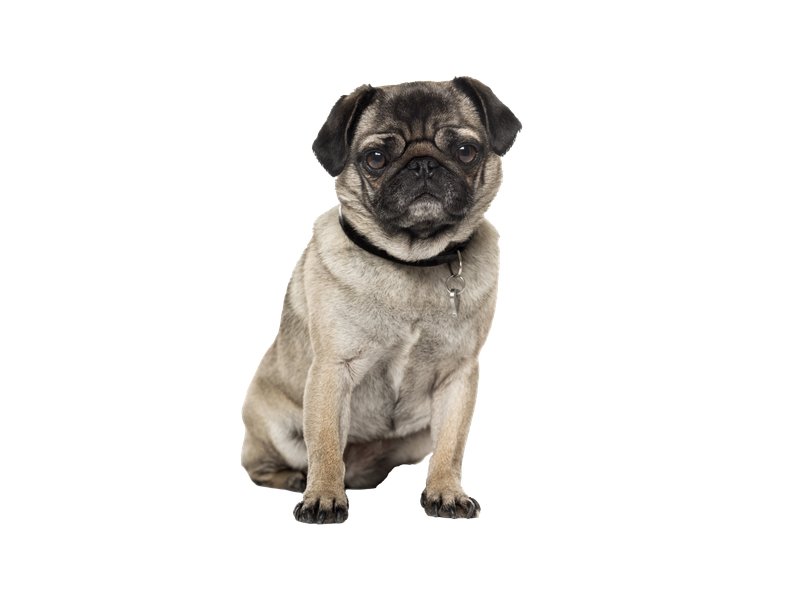Brachycephalic dogs and BOAS
Everything you need to know about brachycephalic dogs and BOAS.

Brachycephalic dogs, also known as flat faced dogs, are beloved by people across the UK. In fact, according to our National Dog Survey, brachycephalic dogs including French Bulldogs, Pugs and Cavalier King Charles Spaniels, make up some of the UK’s most popular breeds. If you’re thinking about adding a flat faced dog to your family, there are some things you need to take into account.
What does brachycephalic mean?
The term ‘brachycephalic’ refers to breeds with short noses and/or flat faces like Pugs and French Bulldogs, but also to other breeds such as Boxers, Boston Terriers and Pekingese.
Brachycephalic dogs can sometimes struggle with various health issues related to this body shape, one of which is a condition known as BOAS – Brachycephalic Obstructive Airway Syndrome. Dogs can be affected by this to varying degrees.
What dogs are considered brachycephalic?
Brachycephalic dogs range in size and shape. The following breeds are considered brachycephalic; however, this list isn’t exhaustive, and any dog can experience BOAS – especially crossbreeds with shortened noses. Additionally, many brachycephalic dogs will not have issues with BOAS.
Breeds considered to be brachycephalic include:
- Affenpinscher
- American Bulldog
- Boxer
- English Bulldog
- Brussels Griffon
- Bullmastiff
- Boston Terrier
- Cavalier King Charles Spaniel
- Cane Corso
- Chihuahua
- Chow Chow
- Dogue De Bordeaux
- English Toy Spaniel
- French Bulldog
- Japanese Chin
- Lhasa Apso
- Pekingese
- Pomeranian
- Pug
- Shar Pei
- Shih Tzu
- Yorkshire Terrier
What is BOAS?
Brachycephalic Obstructive Airway Syndrome can impact every dog differently. This occurs due to their short-nosed and flat facial shape and results in difficulty breathing (noisy breathing, increased breathing effort), exercise intolerance, increased risk of heatstroke and even gastrointestinal problems such as regurgitation.
Specific features that might be encountered in a dog with BOAS include narrow nostrils, a long soft palate (located at the back of the mouth) and a narrow windpipe, however not all brachycephalic dogs will have these features.
What do I do if I think my dog might have BOAS?
If your dog is having breathing problems or showing signs that you think are consistent with BOAS, contact your vet. They will assess your dog for signs of BOAS and may refer them to a specialist if needed.
How do you treat BOAS?
Treatment for BOAS depends on the severity of the condition and will be guided by your vet. In mild cases, treatment can involve careful management, including making sure the dog is not overweight and taking care not to excessively exercise your dog, particularly in warm weather. In the summer months, walk them early in the morning or late in the evening to prevent them from getting heat stroke.
In more severe cases, surgery may be required, which can be costly and can also be associated with severe complications. Consider getting pet insurance as soon as you get your dog, before any signs of illness start.
How can I get a brachycephalic dog that doesn’t have health problems?
All dogs can have health problems, but there are things you can do to ensure you’re buying your dog from a reputable breeder who takes breeding healthy puppies seriously.
Do research to find out what health testing should be done for the breed you’re interested in.
Find out whether your breeder is part of the Kennel Club Assured Breeders Scheme or the Scottish Society for the Prevention of Cruelty to Animals (SPCA) Assured Breeders Scheme and find out what health tests have been done on the puppy’s mother and father – you can ask for copies of their health certificates too.
Additionally, you could use the Kennel Club’s Assured Breeders Scheme Puppy Contract. This is a legal document that protects both yourself and the seller and ensures there is documentation of all that was promised and agreed upon.
You may also consider setting up a pre-purchase consultation with your vet or vet nurse to have a detailed chat about buying a puppy or dog.
Find out more about how to get a puppy or dog responsibly, and what questions to ask a breeder.
Brachycephalic dogs are some of the most popular, and the demand for brachycephalic puppies is incredibly high. Because of this, brachycephalic breeds are some of the most common breeds that are smuggled into the country by unscrupulous illegal breeders. We are working to stop this cruel trade. Find out more about our work to ban puppy smuggling.


